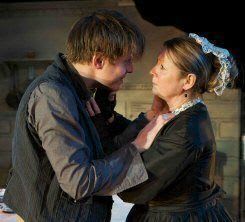What makes someone like Nicholas Wright, with a more than passing interest in a historical figure like Vincent van Gogh, think of their subject not "I'll write a biography," but "I'll write a play"?
Is it the idea of allowing the subject to live again briefly on stage? The desire to show off extensive research into their life? Or is it a desire to fill the inevitable gaps in our historical knowledge through a medium which is, unlike biography, forgiving of unsupportable speculation?
If you've never wondered what van Gogh did during the few years he spent in North London, Vincent in Brixton has precious little to offer you besides its competent dramaturgy. If you have ever wondered, it can still provide only Nicholas Wright's best guess version of events.
Wright is ahead of many of his fellow historical void-fillers in that he knows how to write a play. Vincent in Brixton is theatrical: it doesn't drag despite its two hour runtime, its dialogue is believably dated without descending into parody and it even manages some light-hearted humour.
Mark Edel-Hunt, too, is likeable yet dangerous as the earnest yet abrasive Dutchman. He descends among the inhabitants of Mrs Loyer's Hackford Road boarding-house, tactlessly yet innocently imposing his own sense of order on everyone around him, altering their lives for better or worse in the process.
Quite why designer Christopher Hone has chosen to shade and highlight his set with a black marker, when the rest of the productions carries no hint of similar stylisation, is anyone's guess. Luckily it isn't too distracting, and is far outshone by the impressive logistical feat of installing a plumbed-in sink plus functional oven and hob on stage.
Even the characterisation of van Gogh's companions, who must all be at least partially Wright's invention, is deft, subtle and convincing.
But good writing and production can't hide the fact that Wright wrote Vincent in Brixton because he was interested in the missing portions of van Gogh's life, not through any desire to explore a theme in a dramatic way.
The programme notes reveal that Wright reveres Chekhov, and that Chekhov's usual four-act structure was the template for Vincent in Brixton. But narrative structure is all he has taken from Chekhov, ignoring that structure's suitability for gradually unravelling people's respectable facades and exposing the raw human emotion underneath.
The play touches on some meaty issues, notably that of dealing with depression long before it was recognised as a treatable medical condition. But instead of being fully explored, it functions superficially as a characteristic for van Gogh and his notional love interest to share, then as shorthand for her reaction to van Gogh's departure. If it doesn't relate somehow to the portrayal of van Gogh, it isn't important.
Vincent in Brixton is clearly a labour of love, and is more successful as a piece of theatre than most similar plays. But like nearly all such works, it's a historical curiosity whose influence extends no further than the footlights.
Until 14th March, then at South Hill Park Arts Centre, Bracknell (19th-21st March), Buxton Opera House (9th April), Seckford Theatre, Woodbridge (11th April), Northcott Theatre, Exeter (16th-18th April), MacRobert Theatre, Stirling (23rd-25th April), Adam Smith Theatre, Kirkcaldy (28th-29th April), Harrogate Theatre, Yorkshire 30th April-2nd May), Yvonne Arnaud Theatre, Guildford (26th-30th May), Devonshire Park Theatre, Eastbourne (1st-6th June).
